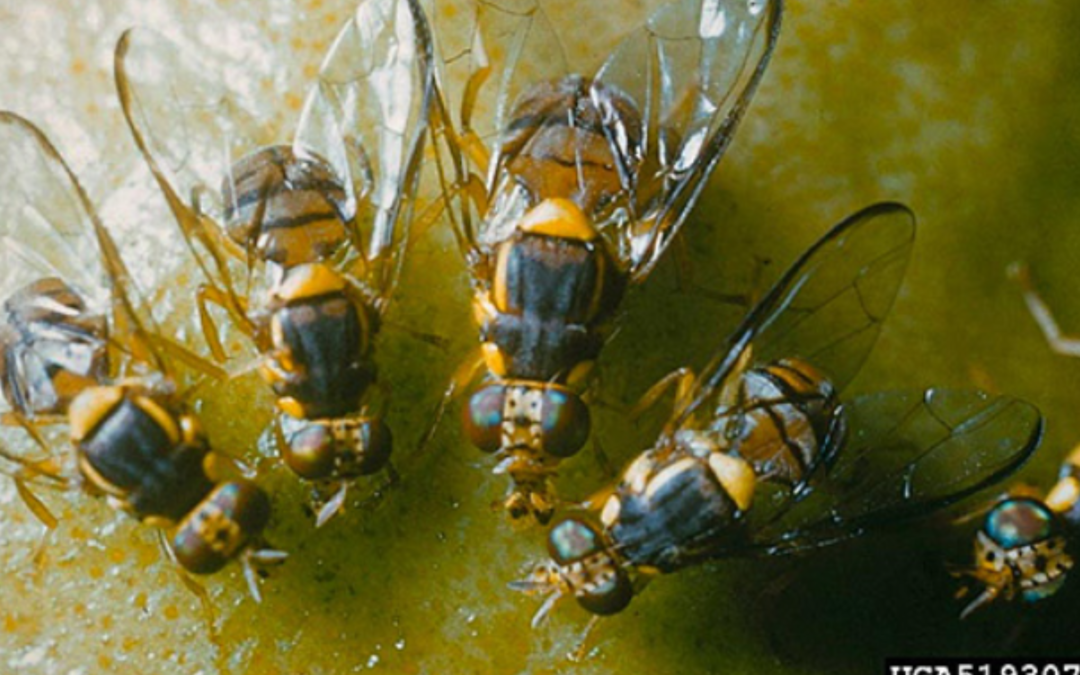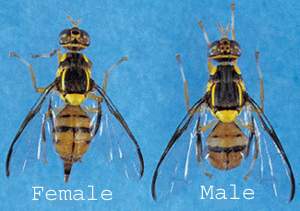MONDAY, NOVEMBER 6, 2023. BY VINCE ARELLANO, CDFA.
Featured Image: Credit – Florida Division of Plant Industry Archive, Florida Department of Agriculture and Consumer Services, Bugwood.org
The oriental fruit fly, Bactrocera dorsalis, is an invasive exotic fruit fly that can cause major economic losses to the agricultural industry. It is native to Asia and has been established in Hawaii. Infestations in California occur when oriental fruit fly infested fruit is illegally imported (smuggled) into the state.
All exotic fruit flies lay their eggs in host fruits and vegetables. The hatching larvae (maggots) will feed on the fruit. You will not know by looking at a piece of fruit that it contains fruit fly larvae. The mature larvae will exit the fruit, then burrow into the soil and pupate. They will finally emerge as adult flies. They can have multiple generations when host fruits and vegetables are available. Depending upon the species, the host list can contain 70 to over 100 suitable hosts.
Female and male Oriental Fruit Fly, CDFA.
The California Department of Food and Agriculture (CDFA) has a trapping program targeting adult oriental fruit flies and other invasive exotic fruit fly species. When one or more flies are trapped, the number of traps is increased in an effort to locate the center of the infestation. Trapping two or more flies also triggers eradication efforts. This might also trigger a quarantine, as the quarantine trigger is different for each fly species. Through eradication and quarantine activities, all past oriental fruit fly infestations in California have been eradicated. It is estimated that the cost of not eradicating oriental fruit flies in California would range from $44 to $176 million in crop losses, additional pesticide use, and quarantine requirements. Oriental fruit fly has been introduced into California a number of times through the movement of infested fruits and vegetables into the state. Although infestations have occasionally been found in California, these have all been successfully eradicated.
The Rancho Cordova (Sacramento County) Oriental Fruit Fly Quarantine was enacted on September 17, 2023. Since there are no commercial growers within the area, it was an eight-fly quarantine trigger. Areas with commercial growers are a six-fly trigger. The quarantine boundaries are established at four and a half miles from each fly find, which has resulted in a quarantine area of 106 square miles to now 137 square miles. The quarantine will conclude after three lifecycles without any additional fly finds. The current projection is the quarantine will conclude in mid-June of 2024.
In Sacramento County, detections in and around the city of Rancho Cordova have resulted in a quarantine area of 137 square miles, bordered on the north by Madison Ave. in the community of Foothill Farms; on the south by Elder Creek Road; on the west by 28th St. in Sacramento; and on the east by Douglas Road near Sunrise Blvd.
All oriental fruit fly host material grown within the quarantine area must undergo either pre-harvest or post-harvest treatments. These treatments are monitored by Oriental Fruit Fly Project staff which issue Limited Permits or Harvest Certificates that accompany each load.
Pre-harvest bait treatments are conducted for fresh market fruit. After the treatment cycle is completed, the Project staff issue Harvest Certificates which allow the fruit to be sent to packing houses, farmers’ markets, fruit stands, retail markets, or wholesale markets. Limited Permits are issued for post-harvest treatments or processing. Grapes for crush is one type of processing. The Limited Permit states the grapes must be transported directly from the vineyard to the winery within 24 hours. No treatments are required prior to harvest and transporting to crush. There are some requirements for the disposal of green waste. All establishments within the quarantine area that grow, handle, transport, or sell oriental fruit fly host material are contacted by the Project staff and issued compliance agreements with exhibits specific to their activities.
Close-up of oriental fruit fly. Photo Courtesy of Martin Hauser/California Department of Food and Agriculture.
Following the principles of Integrated Pest Management (IPM), agricultural officials use the “male attractant” technique as the mainstay of the eradication effort for this invasive species. This approach has successfully eliminated dozens of fruit fly infestations in California. Trained workers squirt a small patch of fruit fly attractant mixed with a very small dose of an organic pesticide, Spinosad, approximately 8-10 feet off the ground on street trees and similar surfaces; male fruit flies are attracted to the mixture and perish after consuming it. The male attractant treatment program is being carried out over an area that extends 1.5 miles from each site where the oriental fruit flies were trapped.
Prior to trapping fruit flies in an area, there are no necessary preventative measures that commercial growers, Certified Producers, or homeowners with fruit trees need to take. When a quarantine is implemented, all host material within the quarantine area cannot be moved off the property unless it undergoes an Exotic Fruit Fly Project-approved treatment. For growers, they can enter into a pre-harvest bait treatment program, or send their fruit to a post-harvest treatment facility, or to a commercial processor. For homeowners, the approved treatment is processing which includes cooking, canning, freezing, drying, and juicing. Homeowners must not give away their unprocessed backyard fruit to friends or relatives.
Residents with questions about the project may call CDFA’s Pest Hotline at 1.800.491.1899. Additional information may be found here: cdfa.ca.gov/plant/off.
Please join us for our monthly CD11 IPM Network Breakfast meeting, on Tuesday, November 7, where Vincent Arellano, Senior Environmental Scientist with CDFA will be presenting about the Oriental Fruit Fly and its threat to vineyards.
CD11 LODI IPM NETWORK BREAKFAST MEETING
Date: Tuesday, November 7, 2023
Time: 8:00 – 9:30am
Venue: Burgundy Hall, Grape Festival Grounds, 413 E Lockeford St, Lodi, CA
Cost: FREE, all are welcome & encouraged to attend
Credits: 1.5 hrs DPR CE (OTHER) applied for
Special Guest & Topic: Vince Arellano, Senior Environmental Scientist, CDFA – Oriental Fruit Fly
Who Should Attend: Local Pest Control Advisers (PCAs), GROWERS who manage their own pest control (PRIVATE APPLICATORS) or who have pest control questions, anyone looking for viticulture DPR CE credits, viticulture TECHNICAL ADVISORS in Lodi, and winemakers/grower relations personnel interested in learning about vineyard pest management.
Description: Our group meets monthly to discuss current vineyard pests and their management. The goal is to create a strong local network for communicating the best IPM strategies and for support in solving viticultural anomalies. Fruit flies have been a big problem this year in many crops across California. This month, our IPM meeting will focus on the California-quarantined oriental fruit fly (Bactrocera dorsalis, detected in Sacramento Co. on September 12, 2023) and its threat to vineyards. Damage occurs when the female lays her eggs inside fruit, which then hatch into maggots. Note that this species is not the one responsible for typical sour rot.
For general information on the oriental fruit fly, the University of Florida has a nice overview here (note that is has not been updated since 2016): entnemdept.ufl.edu/creatures/fruit/tropical/oriental_fruit_fly.htm.
View the CDFA’s current map of California quarantines to see if your property is inside or outside a quarantined region here: cdfa.maps.arcgis.com/apps/webappviewer/index.html?id=d76b6122de514808bf89dc4438d6fb09.
RSVP: To the Lodi Winegrape Commission by phone 209.367.4727 or email info@lodiwine.com.
Have something interesting to say? Consider writing a guest blog article!
To subscribe to the Coffee Shop Blog, send an email to stephanie@lodiwine.com with the subject “blog subscribe.”
To join the Lodi Growers email list, send an email to stephanie@lodiwine.com with the subject “grower email subscribe.”
To receive Lodi Grower news and event promotions by mail, send your contact information to stephanie@lodiwine.com or call 209.367.4727.
For more information on the wines of Lodi, visit the Lodi Winegrape Commission’s consumer website, lodiwine.com.
For more information on the LODI RULES Sustainable Winegrowing Program, visit lodigrowers.com/standards or lodirules.org.





